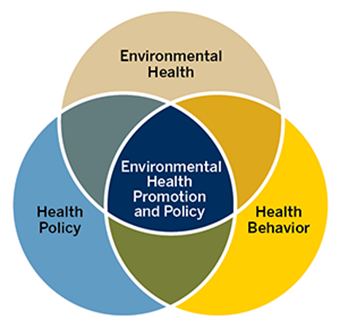The information contained in this article is not intended as legal advice and may no longer be accurate due to changes in the law. Consult NHMA's legal services or your municipal attorney.
During the past year, the local health officer has fulfilled an important role in New Hampshire’s cities and towns by responding to COVID-19 concerns and questions. Often, health officers were on the front lines investigating sanitary conditions and COVID-19 cases. Many took on the role of learning the executive orders and reopening guidance, which required them to perform compliance inspections and respond to COVID-19 concerns in businesses, housing complexes, schools, community centers, and other public locations. Health officers were often the best and only ‘local’ experts for providing best practices and guidance to reduce the spread of COVID-19 at a community level.

Figure 1 Health Officers play a vital role in ensuring safe and healthy environmental conditions.
New Hampshire’s COVID-19 response has provided many lessons learned on how to best assess threats and manage public health emergencies at the state and local level. As part of its response to the COVID-19 pandemic, NH DHHS identified some areas for improvement and for further collaboration with local health authorities. Some of the gaps identified include the need to improve communication, clarify local public health readiness, and support for basic training of local health officers.
As a result of these COVID-19 lessons, a number of partners joined forces with the goal to improve local public health. A workgroup convened to propose changes to RSA 128, including representatives from the New Hampshire Health Officer Association (NHHOA) in partnership Representative William Marsh (R-Brookfield), NH DHHS, the New Hampshire Municipal Association (NHMA), and local health officers. One over-arching goal was to improve health officer competency and train health officers to better understand and apply the laws they enforce. Other goals included the ability to protect local public health as well as facilitate the proactive preparedness of local municipalities to respond to environmental threats. It took many months of negotiations to get the language right to address the needs of municipalities and the state, and in the end, it resulted in HB 79 that addressed health officer training, communicable disease, and the closure of public pools. Surprisingly, the bill passed the House and the Senate with no changes whatsoever.
On June 9, 2021, the Governor signed HB 79 the bill into law. As a result of the passage of this bill, the following changes have been made to RSA 128:
- Health officers must complete a 3-hour training module within the first year of their appointment (provided free-of-cost by DHHS);
- Health Officers may receive confidential data related to communicable disease provided they meet certain criteria as outlined by RSA 141-C:10 V;
- Local Boards of Health shall meet once a year to review the state of readiness to respond to local public health issues;
- Local Boards of Health may be requested to provide information to DHHS on the readiness to address relevant public health threats at the local level.
In response to these legislative changes, the NH DHHS’ Health Officer Liaison program hosted a webinar at the NHHOA’s Spring Workshop as well as a joint webinar with NHMA on June 23, 2021. These trainings informed local health officers and other municipal officials of these recent legislative changes, how to comply with these changes, as well as how DHHS plans to implement these statutory requirements. Toward that end, DHHS has already begun to plan for the 3-hour training requirements, providing access to training courses on confidentiality, and providing guidance to local Boards of Health on how to complete any meeting and reporting requirements. DHHS’ Health Officer Liaison program continues to stay in communication with municipal health officers through its private listserv as rollout on these changes continues.

Figure 2 Health Officer Responds to Hoarding, 2020
Health officers are an important municipal asset that can help towns solve problems and keep the community safe from unsanitary conditions. Health officers receive state support through the DHHS Health Officer Liaison program which is responsible for appointments, training opportunities, and providing technical assistance. The program’s services are intended to increase local health officer’s knowledge, skills, and ability to resolve local environmental health issues. The overall goal is to improve local response capacity and protect citizens while enhancing the skills, knowledge, and capabilities of local health officers and their deputies.
Summary of RSA Chapter 128
Under RSA Chapter 128, ‘Relative to Town Health Officers’, each New Hampshire town is required to nominate, support and renew a health officer position every 3 years for the purposes of enforcing public health laws and protecting citizens. Local health officers are responsible for assessing and enforcing sanitary laws to reduce environmental hazards and health effects. The health officer is a valuable local asset to help identify and resolve public health issues like housing conditions, health nuisances, septic failures, unsanitary living conditions, hoarding, and pest infestations before they affect the larger community.
The role of the health officer is to ensure that towns maintain sanitary conditions in places where people gather, live, work and learn – with a special focus on rental dwellings, buildings, property, schools, childcare, and foster/adoption homes. The sanitary challenges can range from pest infestations to nuisance odors and noise, to unsanitary living concerns and hoarding. Under state law, your local health officer plays a key role in protecting the health and well-being of New Hampshire communities.
Local health officers have a variety of statutory duties and responsibilities to fulfil their role, including the following:
- Performing sanitary inspections and inspections into causes of danger to the public health (RSA 128);
- Enforcing state public health laws and local codes (RSA 128/ RSA 147);
- Adopting local ordinances to regulate the prevention and removal of nuisances and other regulations related to the public health (RSA 147); and,
- Educating community members on issues concerning local environmental health and sanitation.
Information on RSA 128 and NH DHHS’ Health Officer Program can be found below:
RSA 128: http://www.gencourt.state.nh.us/rsa/html/X/128/128-mrg.htm
NH DHHS’ Health Officer Program: https://www.dhhs.nh.gov/dphs/holu/index.htm

By Sophia Johnson, MPH, Health Officer Specialist, New Hampshire Department of Health and Human Services Health Officer Liaison Program. Sophia graduated with a Masters Degree in Public Health from the University of New Hampshire and has worked as an Environmental Health Specialist with the NH Manchester Health Department performing sanitary inspections and enforcement before joining NH DHHS’ Health Officer Liaison program. She is responsible for managing health officer appointments and training in addition to providing technical assistance.
For questions regarding local health officers or RSA 128, please contact Sophia at 603-271-3468 or healthofficer@dhhs.nh.gov.